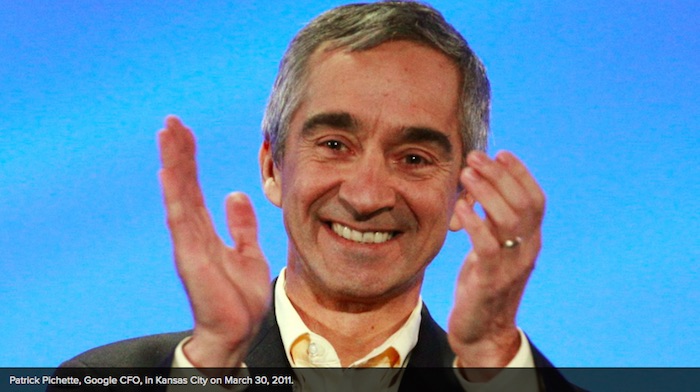
The other morning I read that Patrick Pichette, the CFO of Google, would be leaving the company in order to spend more time with his wife.
In fact, before going any further with this post, you should probably just take a moment and read his full statement here.
I had a few reactions to this.
First, the transparency is exceptional. I love Patrick’s willingness to share some fairly raw pieces of his life with all of us random crazies around the internets.
Second, it’s bold. No matter what level you’re at in an organization, inertia and momentum generally drives us towards one intellectual conclusion: don’t quit. Just keep doing what you’re doing! Quitting is scary, because it represents the unknown, and most of us kind of hate that. So kudos to him for having the courage to change something.
Third, I wish Patrick nothing but the best. The affection he has for his wife shines clearly through his writing — I hope they start that hike, and that they do just keep going.
Fourth, if this guy can’t make this choice, the rest of us are absolutely, completely, utterly screwed. In 2013 he made about ~$5 million and likely is worth far more than that.
Fifth, does anyone else read this story and wonder why the f*$@ there are seemingly only two choices for our work-lives:
- Give your entire life to your job and mostly ignore your family, or
- Make enough money so you can quit your job and go be with your family.
When did this become OK?
When did these trade-offs become so commonplace as to become completely acceptable?
Why can’t we find ways to create rhythmic work — work that is fulfilling and impactful, that pays us enough to live AND gives us the necessary space to live our lives?
When did these things become mutually exclusive?
We need to figure this out, because I refuse to believe that these are the only two choices we have.
//

2 Comments
Lisa Schenk
Hi Josh! I’m so glad you posted this. As you know, I faced a similar situation recently (with obvious differences, including I wasn’t the head of Google!). When I left, the President of the company asked me, “What can we do to keep you here? If you are going to be a consultant doing what you do here, why can’t we find a way to make this role work?” At the time, I was too far out the door to even try. But just yesterday, I came across Greg McKeown’s book “Essentialism” (for a nice introduction: https://www.youtube.com/watch?v=T9x6D09AKBU), which he began with a story that sounded a lot like mine. Executive succeeds, executive gets pulled into more and more, executive gets tired, executive decides to quit and be a consultant so that he/she can have a more balanced and fulfilled life. But McKeown’s executive was offered an alternative I liked a lot: “Retire in Role” Retiring in role seems to mean figure out what you’d do if you had control over your time and just do that. I suspect there’s more to it in the book (I haven’t read it all yet), but this alone as a concept seems like a step in the right direction! Wish I’d thought of it! :-)
Josh Allan Dykstra
Sounds fascinating! Thanks for sharing this idea, Lisa — I hadn’t heard of it. I’ve heard of similar-sounding things happening at Semco or SAS, but that’s probably the closest I know of. Love it.